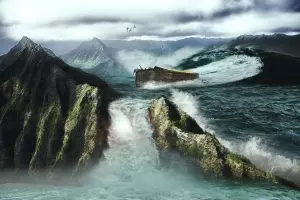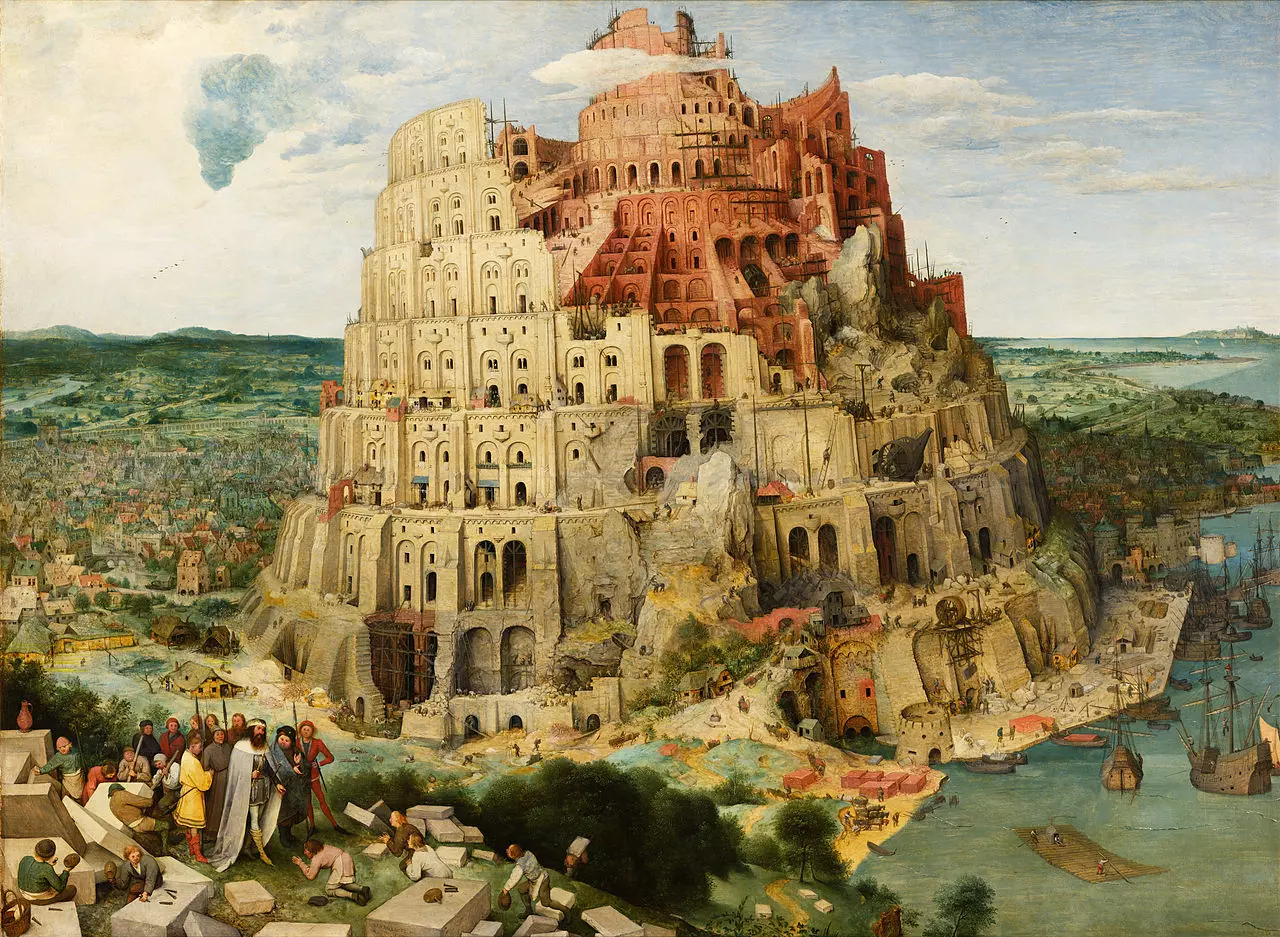Have you ever thought about why God confused the languages of mankind at Babel? I think a lot of people see it as a sort of judgment, and perhaps it was in part, but I think there’s another aspect that we often fail to recognize.
Before the flood, all of mankind had a single language1 and were descended from a single man and woman.2 They were one big family. They had a common culture – just one culture for all of mankind. We don’t know precisely how many people there were on earth by the time of Noah’s flood. It could easily have been millions. We don’t know how many cities they lived in. It might have been many. But they shared a common culture. They were one nation.
We know from the Bible that while God judges each of us individually based on our actions, He also judges nations.3 When He acted in judgment upon various nations throughout history, there might have been some innocents there who also experienced the judgment, but it was because their culture was corrupt.
People are, and have always been, very strongly influenced by their culture. While there are sometimes a few who resist the culture in order to stand on principle, they are usually quite rare. Cultural values, norms, and traditions are pervasive and affect how people think. So when a culture goes bad, the people usually go bad with it. Since cultures are created by fallible humans, they all go bad eventually.
 That is what happened before the Flood. The antediluvian culture went bad and the people went bad right along with it. Scripture tells us that “the wickedness of man was great on the earth, and that every intent of the thoughts of his heart was only evil continually.”4 So God sent judgment on that culture which resulted in wiping out every person on the planet, except Noah and his family, in a global flood.5 Just eight people, out of millions, were saved, and humanity had to start over. After the Flood, God gave a promise to Noah and, by extension, to all of humanity that He would never again flood the entire earth or destroy all creatures.6
That is what happened before the Flood. The antediluvian culture went bad and the people went bad right along with it. Scripture tells us that “the wickedness of man was great on the earth, and that every intent of the thoughts of his heart was only evil continually.”4 So God sent judgment on that culture which resulted in wiping out every person on the planet, except Noah and his family, in a global flood.5 Just eight people, out of millions, were saved, and humanity had to start over. After the Flood, God gave a promise to Noah and, by extension, to all of humanity that He would never again flood the entire earth or destroy all creatures.6
That is the backstory. That is the setting we must consider when discussing God’s reasons for the confusion of languages at Babel. A bad culture leads people astray into wickedness that necessitates judgment. A single culture turned the pre-Flood people away from God and resulted in global destruction.
Thus, when God told Noah and his family to populate the earth,7 He wanted them to spread out for a reason. He wanted different groups in different regions to develop different cultures so that when one goes bad, it doesn’t spread to all of humanity again. God had a promise to keep, and keeping that promise meant that blatant evil needed to be quarantined so it didn’t infect all of humanity.
Yet despite God’s command, the people gathered together in one culture and started building a tower and a city.8 Having a common symbol to unite them and a common family identity would have recreated the same conditions that led to global judgment before. The most merciful thing God could do in such a situation was to save humanity by dividing it.
God gave the people different languages according to family units.9 Each husband, wife, and their young children had a common language, but they could not understand other families. This inability to understand one another drove them apart to found their own cultures in different parts of the world. God’s goal was accomplished.
While it might have also been partially justice that motivated God to separate different people groups with different languages, it was primarily mercy. Their separation allowed protection for mankind so that they would never be destroyed all at once again. God did judge individual nations who declined into blatant evil, but because mankind was divided, this did not necessitate a global judgment. Furthermore, God chose a particular nation – the Israelites – to serve as the means by which He would give His word to mankind and, ultimately, through them bring the Savior.
The book of Genesis is a history book that gives us a perspective on the world that we would not have otherwise. Those who doubt the historicity of Genesis have a harder time explaining the world as it exists now. The common ancestry of all humans, the many languages we speak, and the distinct cultures we find all over the world fit very well with what we are told in Genesis. In addition to its history, Genesis also gives us a picture of God’s justice, mercy, and grace. Through Genesis we learn that God judges wickedness, but also that He acts mercifully toward mankind. The cultures and languages that divide us are a testimony to God’s mercy on us and His faithfulness to fulfill His promises.
- Genesis 11:1
- Genesis 3:20, Acts 17:26, Romans 5:12-15
- Genesis 15:14, Deuteronomy 8:20, Psalm 67:4, etc.
- Genesis 6:5, NASB
- Genesis 6:17-18
- Genesis 8:21 & 9:11-15
- Genesis 9:7
- Genesis 11:1-4
- Genesis 10:31-32







Lindsay, Thanks for your timely article on the mercy of God in the context of the dispersion of the languages at Babel. In preparing for some presentations I’ll be giving, I have discovered some insights that would be intriguing to discuss with you sometime. Regarding the Babel dispersion, I spotlighted God’s mercy as you did. Think of it. From the Sumerians in the plain of Shinar (similar root – shumer), God raised up the culture of Ur of the Chaldees within less than two or three hundred years after the ‘mabul’ (Deluge) during the time of a post-flood “ice age.” By God’s mercy, He called Abram out of Ur to preserve his righteous line to the Messiah. What’s really fascinating is that the now submerged coastal megalithic cities had to have been built before the melting of the huge ice accumulation that engulfed them at about the time of Peleg. Could those cities have been built only after Nimrod led the rebellion at Babel? The implications for putting the puzzle of history together are intriguing, aren’t they?
I think the time of Peleg was the time of the tower of Babel. I don’t think it was a geological division, but rather a division of languages and people groups. The ice age was likely keeping sea levels lower at the time of Babel and for some time afterward and thus allowing for easier dispersal of people to far distant lands. Some cities were built by the dispersing peoples that were later inundated when sea levels rose at the end of the ice age. I expect that all such cities post-date Babel and the confusion of languages.
Lindsay, I enjoyed your article. Common sense and the understanding of God’s nature goes a long way in interpreting scripture.
I had always thought of Babel (Genesis 11:1-9) as being God’s judgment upon mankind but His mercy as a reason for doing it also makes a lot of sense. Even so, the globalists and the multiculturalists under satanic influence continue striving to undo what God in His wisdom did at Babel. The world will again eventually become as ONE, but united together against God and His Son, Jesus Christ in the end times until He comes again to judge the nations, to reign over the nations and to establish the Kingdom of God in this world. God has a different and a better plan for ultimately reuniting the nations which is being ONE in Christ Jesus (Ephesians 1:10; Galatians 3:28; Revelation 7:9-10). This is the only way such unity will ever work.
O LORD, I have heard thy speech, and was afraid: O LORD, revive thy work in the midst of the years, in the midst of the years make known; in wrath remember mercy.
—Habakkuk 3:2 KJV
God’s mercy is ever part of God’s adverse judgement in the world. Indeed, the judgement of the Flood was a mercy upon mankind, and possibly even upon Noah and his family. The judgement upon the Babel culture clearly was not the annihilation of its people, so there is only one option to consider: mercy upon them and their descendants. For, God is not capricious, but ever has a plan. He was not lashing out. He was effecting His designs, which He already had, and He knew they would do this. The evidences of the Flood, both the physical and cultural, are the sufficient global witness for a final judgement. God shall end corruption and death, so all fallen humans ought to consider everything in this light. Noah and Shem, after the Flood, were about reminding everyone of this. Noah even understood Shem’s inclination and qualifications in this, and so gave Shem the Adamic priesthood.
Upon the death of Noah, Shem would have found himself to be all of future history’s best analogue to Adam’s own state of face outside the garden.
‘Scattering’ over the whole earth would have forced the Babel group (which was the bulk of humanity outside of the faithful line of Noah) to deeply diversify in both technologies and language. They already were naturally tending to find respective farther parts of the planet appealing, as the combination of their already-existing natural diversity and the geological-meteorological aftermath of the Flood. The post-Flood conditions were already compelling them to ‘scatter’, and this is what provoked them to try to remain a single large people despite their great natural diversities. And they had no loyalty to Noah’s witness. What Abram finally saw, thanks to Shem, was just that same unfaithful group diversified and competing. A world of street gangs cum Communist North Koreas.
Dear Anybody,
I do follow and respect the bible and God as much as I can always asking questions. I’ll make this quick and to the point. However, my question is after the flood all was wiped out correct, no-longer in ex-exist-ants except 8 individuals how was these 8 people able to populate once again after they went their own way and nobody was left? So the Tower of Babel happen after the flood correct?
Thank you for time,
David
After the flood, there were 4 married couples – Noah and his wife, plus 3 sons and their wives. Noah and his wife do not seem to have had any more children because the Bible tells us that it was from their sons and their wives that the earth was populated after the flood (Genesis 9:19). So the 3 younger couples had children and their children married one another and repopulated the earth. They mixed for around 100 years or so until the languages were confused and the people were dispersed from Babel according to paternal clans. Genesis 10 gives us a listing of the people who came from Shem, Ham, and Japeth and were dispersed from Babel.
What is really cool about this account in Genesis is that it fits very well with both genetic and historical evidence. I can give you a brief intro to some of this, but there is a lot more if you want to dig into it.
In genetics, there is a type of DNA called mitochondrial DNA that is not found in the nucleus of the cell, but in the mitochondria. This DNA, unlike the rest of our DNA which comes from both parents, comes only from the mother via the egg. So this DNA traces maternal ancestry only. We know from studying mitochondrial DNA from people around the world that all living humans go back to a single maternal ancestor. This woman was dubbed “Mitochondrial Eve” by genetics researchers. Creationists believe this was actually the Biblical Eve (or possibly some woman descended from her in early human history). So we all go back to one woman, and that fits the Biblical account.
But there’s more. There are 3 main groups – or haplotypes – of mitochondrial DNA. That means 3 groups that have shared variants in their DNA sequence. Each of us goes back to one of these 3 groups. That’s an interesting number because there were 3 mothers after the flood, according to the Biblical account. Noah’s wife had 3 sons, but sons don’t pass on their mitochondrial DNA. There would only be 3 people who passed on mitochondrial DNA – the 3 wives of Noah’s sons. So that’s another point that matches the data.
It gets even better. Remember that the people mixed for about 100 years and then split up into groups by paternal ancestry. That means we expect maternal lineages to be spread all over the world. Paternal lines tend to be regional or local (which we can tell by Y chromosome data, which only goes from father to son). But the 3 maternal lineages are found all over the world. Again, this fits the Biblical account.
So that’s your brief introduction to the genetics evidence. Historically, it’s pretty cool too. We can trace where the patriarchs went who were listed in the Table of Nations in Genesis 10. We have all kinds of historical data that help us do that. These include tribal names, place names, ancient genealogies, legends, inscriptions, and various other historical documentation.
The men listed in Genesis 10 really did exist and father clans of people all over the world. For example, Mizraim, son of Ham, was the father of the Egyptians. Javan, son of Japeth, fathered the Greeks. Gomer, son of Japeth, fathered the Galatians (which you might recognize from the time of Paul) who also became known as Gauls. Gaul is an old name for France and parts of other Western European countries. Portugal, for example, is literally Port of Gaul. The Sinites came from Canaan, a son of Ham. They originally settled the Sinai peninsula, which is named for them, but some later traveled east into China. They conquered the peoples who had already settled there and became the dominant tribe. Sin changed to tchin as the language changed and we derived the name China from them. Language scholars still refer to Chinese as Sinitic. These are just a few examples. This is a really fascinating area of study that really supports the truth of the Biblical account.